It’s Not Easy Being Green: Powering The Future (Podcast)
Jul0

Wind turbines collecting energy that will eventually be converted into electricity and other fuel sources. This technology is widely discussed in the new Discovery Channel special "Powering The Future." Image courtesy of Discovery Channel.
Nothing has done more to reinvigorate discussions about energy and fuel dependence than the tragic oil spill currently afflicting the Gulf Coast [excellent resource for trajectory, timeline and news sources]. Though scientists and oil manufacturers continue to debate the validity of the “Peak Oil” theory, a very uncomfortable reality looms that oil production may not be able to keep up with thirsty demand. With an ever-increasing global population, a constant proliferation of technology choices and lifestyle improvements, and a rising middle class in third world countries, the factors contributing to fuel consumption may be the precipice of an eventual geopolitical crisis. In an effort to showcase their dedication to addressing the most salient energy and environmental questions affecting our generation, the Discovery Channel, backed by founder John Hendricks, is launching a revolutionary four-part documentary called Powering The Future. In it, they address a range of economics, national security, social and scientific questions related to energy and fuel all through the single focal point of searching for a modern, clean, limitless supply of energy. Our coverage of Powering the Future includes a review of the first installment and an exclusive podcast interview with the show’s host, lead scientist for the Nature Conservancy, Dr. M. Sanjayan. For full content, please click “continue reading.”
INTERVIEW: Breaking Bad Creator/Executive Producer Vince Gilligan
Apr1
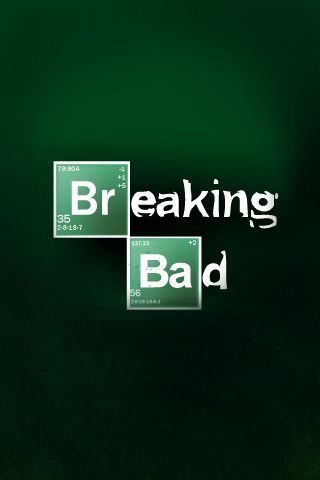
Breaking Bad images and logo ©AMC Television and Sony Pictures, all rights reserved.
Last year around this time, ScriptPhD.com posted Breaking Bad, Chemistry Good, an in-depth article about AMC’s breakout hit Breaking Bad, and its stunningly accurate science content. Walter White, the show’s anti-hero, is a cancer-stricken high school chemistry teacher who starts cooking and dealing methamphetamine for financial security. In our article, we highlighted several clever uses of chemistry throughout the show’s run that not only integrated brilliantly into the plot but had realistic real-world applications as well. What a difference a year makes! Last week, Editor Jovana Grbić sat down with Breaking Bad‘s delightful Creator and Executive Producer Vince Gilligan to talk about the show’s origins, the science, and some behind-the-scenes secrets that will surprise even dedicated fans. We hope you enjoy reading our interview as much as we enjoyed chatting with him. The secrets of Breaking Bad, under the “continued reading” cut.
ScriptPhD Roundtable: Naturally Obsessed—The Making of a Scientist
Apr0
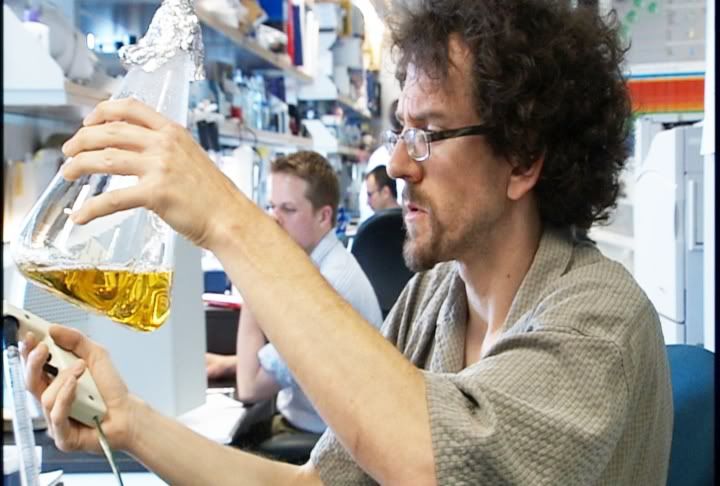
Graduate student Rob Townley mixes solution in a beaker in a scene from documentary "Naturally Obsessed: The Making of a Scientist." Film images ©ParnassusWorks Films, all rights reserved.
Society’s unequivocal fascination with science and scientists, reflected by a growing presence as staples of film, television, and popular culture, has only been magnified by the enigmatic (and seemingly impenetrable) aura in which they are enveloped. Their studies decidedly abstruse, their coded language unintelligible, their habits quirky and eccentric, the world of the scientist has been an audiovisual shroud of mystery—until now. In perhaps the most authentic, unfiltered, extemporaneous portrayal of scientists in their environment ever recorded, new documentary Naturally Obsessed: The Making of a Scientist welcomes the lay audience into the laboratory as silent observers. No reservations, no restrictions, no preconceptions. The result is an emotionally stunning masterpiece that connects us to scientists as people, reaches out across professional divides, and places PhD students, the backbone of the modern scientific laboratory, under the microscope for the first time. ScriptPhD.com recently screened the movie with a group of UCLA PhD biology students. Under the “continue reading” cut is our review, along with an honest roundtable discussion that included reaction to the movie, its parallel to their lives, and the training of modern scientists.
Science and Society: A Policy Analysis
Mar0
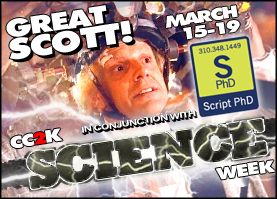
“The fewer the facts, the stronger the opinion.” —Arnold H. Glasgow, American humorist
In today’s modern, fast-moving world, large telecommunication and media corporations are playing an ever increasing role in shaping the collective consciousness of society. This development might lead us to ponder what role, if any, traditional pillars of learning such as law, science, medicine, literature and art have to contribute to society. How does society absorb these contributions during the ongoing media (and social media) blitz that has transformed how we obtain, process and share information. More importantly, what influence do these contributions have upon society, and what influence does society reciprocate upon these institutions? For our last (and best) post of Science Week, ScriptPhD.com examines the relationship between science and society, and extrapolates social policy and pop culture lessons that could shape and transform that relationship in the future. Please click “continue reading” for more.
Guest Article: A Pop-Culture Science Lesson
Mar0

All right class, settle down, settle down. My name is Mr. Ross, but you may call me BR. Welcome to Pop-Culture Science 101. I know what many of you are thinking: “Science is boring; I just don’t get it.” I can understand those sentiments. But that’s only because of the ways you’ve been taught in the past. Today is going to be different. On this, the third day of the Science Week collaboration between ScriptPhD and CC2K, we decided to have a bit of silly fun and cover a couple of traditionally esoteric science topics from an angle I doubt any of you have considered before—pop culture icons. So get out your notebooks and pens, today’s lesson begins now! Please click “continue reading” for more.
INTERVIEW: Engineering Professor and Caprica Science Consultant Malcolm MacIver
Mar4

ScriptPhD.com is extraordinarily proud to present our first ever Science Week! Collaborating with the talented writers over at CC2K: The Nexus of Pop Culture and Fandom, we have worked hard to bring you a week’s worth of interviews, reviews, discussion, sci-fi and even science policy. We kick things of in style with a conversation with Professor Malcolm MacIver, a robotics engineer and science consultant on the SyFy Channel hit Caprica. While we have had a number of posts covering Caprica, including a recent interview with executive producer Jane Espenson, to date, no site has interviewed the man that gives her writing team the information they need to bring artificial Cylon intelligence to life. For our exclusive interview, and Dr. MacIver’s thoughts on Cylons, smart robotics, and the challenges of future engineering, please click “continue reading.”
Discovering LIFE on Planet Earth—Editor’s Selection
Mar2

LIFE logo ©2010 Discovery Channel/BBC, all rights reserved.
In 2006, The Discovery Channel, in partnership with the BBC, premiered the 11-part Planet Earth, the most expensive natural history mini-series ever filmed, and the first in high definition. It gave viewers a sweeping, intimate overview of the Earth’s diverse natural habitats. Yet long before Planet Earth premiered, plans were already underway for its follow-up opus, LIFE, which would focus on the animals, insects, and creatures that call those habitats home. The result, four years in the making, is historic television—never-before-recorded mating rituals, survival scenes, and brutal savagery. For the naturalist and the nature-lover, LIFE will, quite simply, change your view of life. After the “continue reading” cut, we preview the first few episodes and offer a rare candid interview with executive producer Mike Gunton. We are proud to make LIFE on Discovery Channel an official ScriptPhD.com Editor’s Selection.
Video: ScriptPhD Interviews the Science Advisor of ‘Fringe’
Feb0
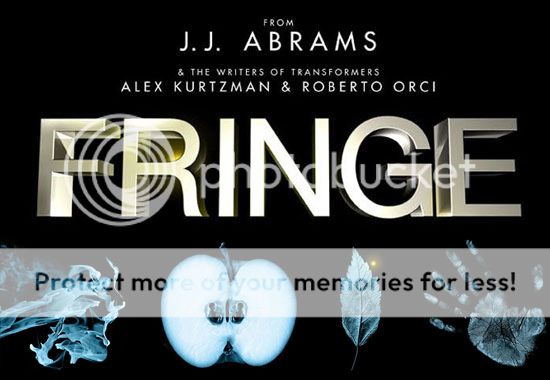
Fringe images ©2008 FOX Broadcasting Corporation, all rights reserved.
ScriptPhD.com’s coverage of Comic-Con 2009 included an interesting panel entitled Mad Science: The Science Behind Science Fiction, which consisted of a panel of top science fiction shows Eureka, Battlestar Galactica, Eureka, Caprica and Fringe. There, we met Dr. Ricardo Gil da Costa, a neurobiologist who is one of the official science advisors to the writers of Fringe. We recently had the opportunity to visit Dr. Gil da Costa on location in his laboratory at the Salk Institute for Biological Studies in San Diego, CA. We sat down to talk about his science, what it’s like to be “on-call” for one of the biggest hit shows on television, how the writers use his knowledge and integrate it into the show, and more broadly, how creatives in the entertainment industry can best utilize the skills of research scientists as they integrate more sophisticated material into their scripts. To watch the video, please click “continue reading.”
Guest Article: HBO’s ‘Temple Grandin’ Biopic Honors Autistic Scientist
Feb2
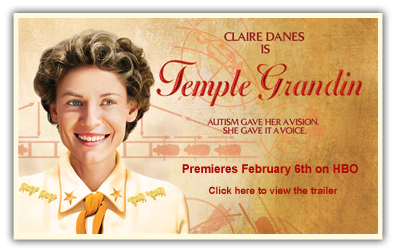
Temple Grandin film poster ©2010 Home Box Office, all rights reserved
This was a remarkable week for autism science and publicity. In a stunning and rare reversal, medical journal The Lancet retracted the 1998 paper responsible for suggesting a link between autism and MMR vaccinations, incurring over a decade of acrimonious debate and frightened parents. Ironic then that this should be the week when HBO premieres their new feature film Temple Grandin, about the eponymous world-famous scientist. Dr. Grandin has written and spoken openly about her struggle with autism and how it’s colored her view of the world and influenced the science she studies. ScriptPhD.com is extraordinarily honored to extend a warm welcome to friend and fellow blogger Susan Etlinger, author of the autism spectrum blog The Family Room, to review the biopic and interview the project’s executive producer. For full content, please click “continue reading.”
REVIEW: Caprica (includes interview with head writer Jane Espenson)
Jan2
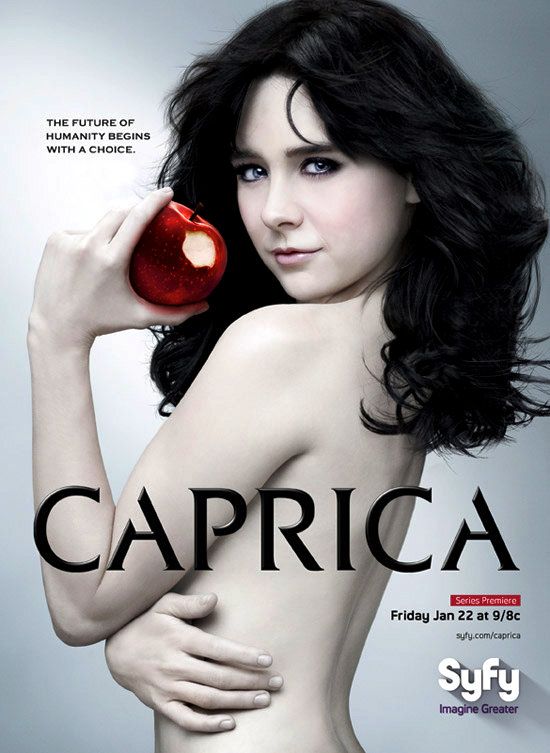
Caprica poster and all images ©2010 NBC Universal, all rights reserved.
No one has been more excited about the premiere of Battlestar Galactica prequel Caprica than ScriptPhd.com. We eagerly joined the cast and crew of both shows last May during their joint panel at the Los Angeles Paley television festival. We were also one of the first sites to review the Caprica 2 hour pilot. And now, at long last, one of the most anticipated sci-fi prequels ever will premiere on the SyFy Channel this Friday. ScriptPhD.com’s Bryy Miller reviews the first three episodes and talks about the show’s early conceptualization and long-term promise. We are also extraordinarily fortunate and proud to bring you an Editor’s interview with series executive producer and show runner Jane Espenson, in which she talks about what we can expect from Caprica. Please click “continue reading” for full content.

















